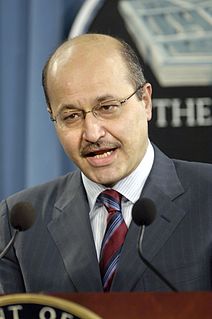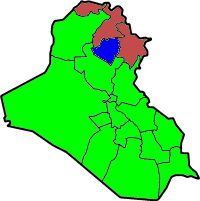The politics of Iraq take place in a framework of a federal parliamentary representative democratic republic. It is a multi-party system whereby the executive power is exercised by the Prime Minister of the Council of Ministers as the head of government, as well as the President of Iraq, and legislative power is vested in the Council of Representatives and the Federation Council.

The Kurdistan Regional Government (KRG) is the official ruling body of the autonomous Iraqi Kurdistan region.
The Iraqi Kurdistan legislative elections of 2005 for the parliament of the Kurdistan Region, were held on 30 January 2005, to coincide with the Iraqi parliamentary election, January 2005 and elections to the governorate councils. It was the first legislative election to be held in Iraqi Kurdistan since 1992.

On 19 May 1992 elections were held to the Kurdistan National Assembly, the parliament of the Kurdish Autonomous Region in Iraq. At the time, the National Assembly had 105 seats, of which 5 were reserved for the Assyrian community. Parties had to achieve more than 7% of the vote to be elected. There were 178 polling stations around the region.

The Yazidi Movement for Reform and Progress is a Yazidi political party in Iraq. The party represents Yezidi people in the Nineveh plains. It ran in the December 2005 elections and won 0.2% of the popular vote, thus receiving one seat in the Iraqi parliament. The party won a local governorate seat in Ninewa in the January 2005 elections and in the January 2009 elections as well.
The Dhi Qar governorate election of 2009 was held on 31 January 2009 alongside elections for all other governorates outside Iraqi Kurdistan and Kirkuk.
The Karbala governorate election of 2009 was held on 31 January 2009 alongside elections for all other governorates outside Iraqi Kurdistan and Kirkuk.
The Maysan governorate election of 2009 was held on 31 January 2009 alongside elections for all other governorates outside Iraqi Kurdistan and Kirkuk.
The Najaf governorate election of 2009 was held on 31 January 2009 alongside elections for all other governorates outside Iraqi Kurdistan and Kirkuk.
The Al Muthanna governorate election of 2009 was held on 31 January 2009 alongside elections for all other governorates outside Iraqi Kurdistan and Kirkuk.
The Al-Qādisiyyah governorate election of 2009 was held on 31 January 2009 alongside elections for all other governorates outside Iraqi Kurdistan and Kirkuk.
The Wasit governorate election of 2009 was held on 31 January 2009 alongside elections for all other governorates outside Iraqi Kurdistan and Kirkuk.

Assyrian politics in Iraq have been taking many different turns since the US invasion of Iraq in 2003. Today, there are many different Assyrian political parties in Iraq. The main Assyrian party that came out from the 2005 elections was the Assyrian Democratic Movement. However, Sarkis Aghajan began to challenge its power beginning in 2006 with the opening of Ishtar TV and the KDP-affiliated Chaldean Syriac Assyrian Popular Council.

The Iraqi Kurdistan legislative elections of 2009 took place on 25 July 2009. A total of 2.5 million citizens of Iraqi Kurdistan were eligible to vote for the parliamentary and presidential elections. People currently living outside Iraqi Kurdistan were not allowed to vote. The elections followed the Iraqi Kurdistan elections of 2005. The parliamentary elections coincided with the direct election of the President of Kurdistan. Unlike the Iraqi Kurdistan elections of 2005, the president of Kurdistan was to be chosen directly through popular votes. A referendum to approve the constitution of Iraqi Kurdistan originally planned for the same day was put back to 1 August.

The Iraqi Kurdistan Governorate Council elections of 2005 were held on the 31 January 2005, to coincide with the Iraqi legislative elections of January 2005 and the Iraqi Kurdistan legislative elections of January 2005. The elections were held to choose 41 council members for each of the three governorates of Iraqi Kurdistan, that is Dahuk, Erbil and Sulaymaniyah governorates. During the election, the Patriotic Union of Kurdistan (PUK) won a plurality of the votes, however, the Kurdistan Democratic Party (KDP) won a plurality of the council seats.

Governorate or provincial elections are due to be held in Kirkuk Governorate in 2009 to replace the governorate council elected in the Iraqi governorate elections of 2005. The remaining governorates outside Iraqi Kurdistan held elections on 31 January 2009.

Governorate or provincial elections are due to be held in Arbil Governorate in 2009 to replace the governorate council elected in the Iraqi governorate elections of 2005. The remaining governorates outside Iraqi Kurdistan held elections on 31 January 2009. The election will follow the Iraqi Kurdistan legislative election, 2009.

Governorate or provincial elections are due to be held in Dahuk Governorate in 2009 to replace the governorate council elected in the Iraqi governorate elections of 2005. The remaining governorates outside Iraqi Kurdistan held elections on 31 January 2009. The election will follow the Iraqi Kurdistan legislative election, 2009.

Chaldean Syriac Assyrian Popular Council popularly known as Motwa is a political party in Iraq that was founded by Sarkis Aghajan, a high-ranking KDP, in 2007. The Party runs Ishtar TV and publishes several different monthly magazines.
The Iraqi Kurdistan Governorate elections were held on 30 April 2014. The elections for the three Kurdish governorates coincided with the elections for Iraqi parliament.









